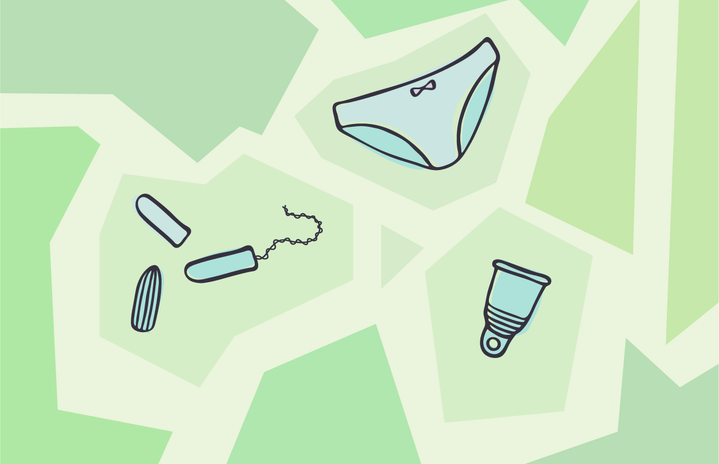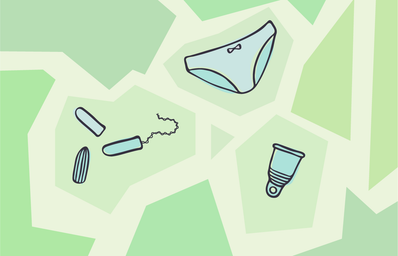It’s that time of the month again. You go to your handy-dandy box of tampons and pads you got from the drug store (maybe while also grabbing a bar of chocolate), and let the products do their thing for however long periods last, and then repeat each month. At this point, this endless cycle has become a mindless reoccurring routine. But, has anyone actually read anything about what we’re putting inside our bodies each month?
According to an article by the Canadian Women’s Health Network, many drugstore tampons and pads contain toxic ingredients such as aluminum, alcohols and hydrocarbons. These feminine hygiene products also include a bleaching process that produces dioxin, “a toxic chemical linked to cancer and perhaps now to endometriosis.”
Alyssa Bertram, the founder of Easy, a delivery service for organic feminine hygiene products, says that what is even more strange than the chemicals themselves, is that these popular brands found in the drugstore are not required to list their ingredients on the packaging.
Both Health Canada and the Food and Drug Administration (FDA) recognize feminine hygiene products as medical devices, so the packaging does not have to disclose ingredients, and “products can be put on store shelves without full toxicological or other safety testing. If a problem arises, it’s only discovered after consumers have purchased and started using them,” according to a 2019 Green at Home article.
“You know what’s in your clothes and in your food but you don’t know what is in this thing that’s sitting in a really intimate part of you,” says Bertram. “When I dug a little deeper into that, I found out that often these products have things like plastic, or synthetic fibers or even bleach by-products that are harmful to our health and can cause infections and toxic shock syndrome, and that freaked me out.”
However, the amounts of toxic chemicals like dioxin in pads and tampons appear in “detectable levels,” according to the Canadian Women’s Health Network. But, “dioxin can build up in your body over time, even the tiniest amount, could affect you.”
At this point, you may be terrified that thousands of chemicals are sitting in your body, but don’t fret, there are other alternatives than continuing to buy your feminine hygiene products from the drugstore each month.
As more people who experience menstruation become more conscious of what they put in their body, many companies are promoting organic feminine hygiene products as an alternative to basics found at the drugstore.
At Easy, Bertram says her products are hypoallergenic, biodegradable and 100 per cent organic, meaning “the cotton is grown without pesticides, without bleach, no synthetic fibers and no plastic in the product, (so the applicators are made from recycled cardboard with a rounded tip.)”
Below is a list of brands without chemicals.
- LOLA
-
LOLA sells customizable packages of feminine and sexual health products that are 100 per cent organic. The brand, which was created by women, focuses on clean, quality ingredients and their products are gynecologist-approved. You can either choose their subscription service, where a customizable box will arrive each month, or you can choose to just start with one box!
@lola on Instagram
- Easy
-
Easy Period is a feminine hygiene delivery service, perfect for those crampy period days where the last thing you want to do is go get tampons or pads. Their products are made with 100 per cent organic cotton and are skin ph compatible. Five percent of the company’s profits go towards supplying girls in Kenya with the feminine hygiene products they need.
@easyperiod on Instagram
By being more aware of the kinds of products we use each month, we also may be helping our environment.
A 2019 study found that around 45 billion menstrual products end up in the trash each year and “the average nonorganic pad takes 500 to 800 years to decompose.” Tampons are often not biodegradable, wrapped in plastic and/or use a plastic applicator, ruining our environment.
Although we do know that regular drugstore pads and tampons are hurting the environment, there has not yet been any groundbreaking research on just how harmful these chemicals are for our bodies.
“Before we can get the research that we need into menstruation, and the safety of menstrual health products, and before companies will take listing the ingredients seriously, we have to have a level of comfort with talking about our periods ourselves,” says Bertram.
If one thing is for sure, this issue needs to be discussed more and the public needs to be informed. Periods should no longer be something that is taboo in the media and everyday conversations. Why? Because periods are natural.


